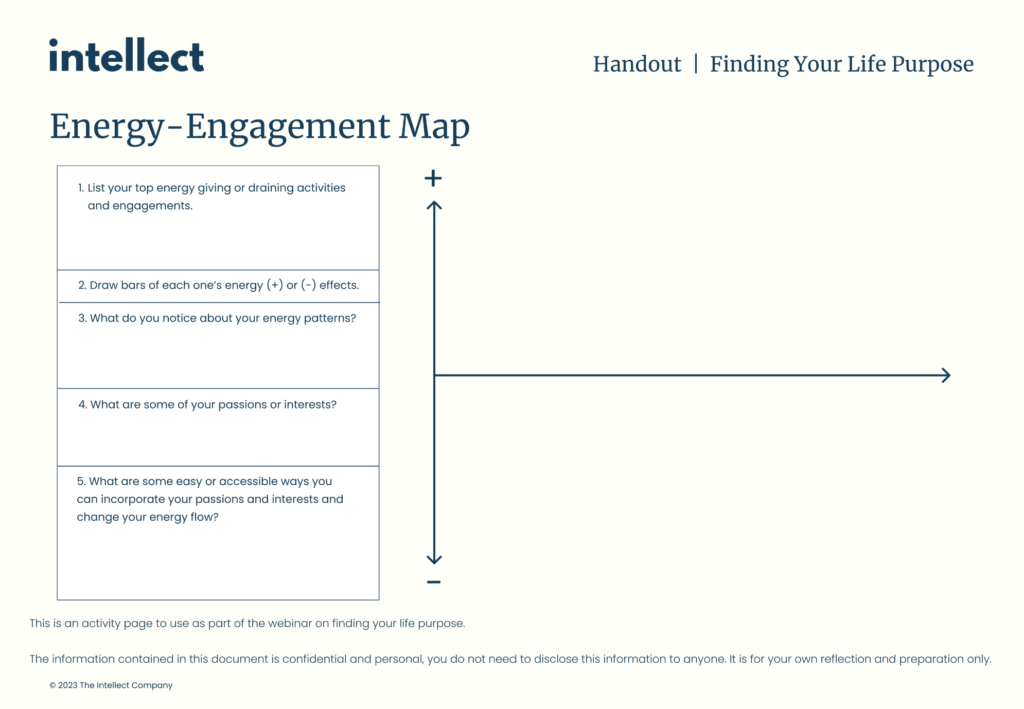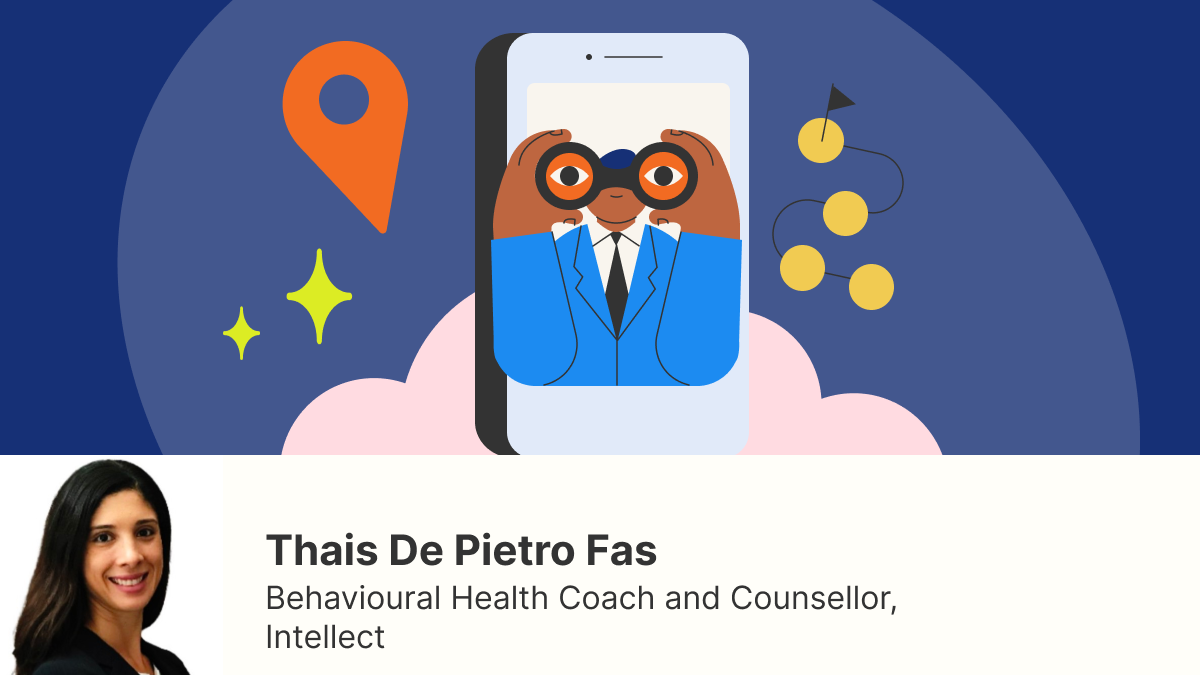No two life paths are identical. Yet, we are all bound by the pursuit of a purpose in both our personal and professional lives.
According to McKinsey’s research in 2022, 70% of employees said that their sense of purpose is defined by their work. When employees find meaning in what they do, they become more committed and perform better in their jobs. This sounds simple, but the journey is as universal as it is convoluted.
In fact, so prevalent is this struggle that Intellect has launched a webinar on finding one’s purpose in life for employees of our partner organisations, bringing their workforces a step closer to self-actualisation. Below is a summary of what it covers.

Haven’t found your life purpose? You aren’t alone.
A life purpose is a sense of meaning or direction that guides a person’s life. Akin to a lighthouse, it gives us clarity of where we are headed. More importantly, it gives us a reason to persevere in a given direction.
According to Thais De Pietro Fas, a behavioural health coach and counsellor at Intellect, our life purpose can change with the seasons of our lives. As we reach significant milestones like graduation, work anniversaries, or parenthood, reevaluating our priorities helps us to find fulfilment across life stages.
You might be wondering how purpose differs from goals. Think of it this way: While our life purpose revolves around the impact we wish to create, life goals are specific outcomes we intend to achieve within a particular time. Life goals are the building blocks that help us reach our life purpose – they are the “how” to our “why.”
| Life goal | Life purpose |
| Become a highly sought-after consultant, earning at least $1M within the next 4 years | Make a significant impact through sharing knowledge and helping individuals/ businesses achieve their goals/successes |
A powerful life purpose statement serves as a reminder for how we might live. “If we are connected to something meaningful [to] us… it brings self-awareness,” shares Thais. When our actions are aligned with our values and beliefs, we get to be our authentic selves. Yet, only 25% of American adults report having a clear sense of purpose (Health, 2019).
For some, the fear of failure can lead to inaction. Afraid that they may never fulfil their purpose, they don’t ever begin finding one. For others, their ideas of success may not align with what is expected of them. Over time, their purpose gets snuffed out by external pressure.

How to find your life purpose
Q1: What are your values and beliefs?
Introspection about one’s life purpose is mainly centered on contribution, service, and impact. When we contemplate who we want to be relative to the world around us, we discover the core values that will inform our choices from here on out.
Journal Prompts:
- What in life is truly important to you?
- What accomplishments do you think need to occur so that you will consider your life to have been satisfying and well-lived?
- What do you consider your role to be in your local community/country/world?
Your values may look different from those of others, but that doesn’t make them any less valid. For example, if you value family above all things, you may not jump at a relocation opportunity the same way a coworker who values new experiences. Neither of your values is objectively better; they’re just different.
Q2: What are your passions and interests?
Reflecting on what energises us can help us discover our passions and interests. The Energy Engagement Map is a systematic way of doing just that, encouraging us to be more mindful of how we spend our day-to-day lives.

Crucial to this step is connecting these activities with the values we identified previously. If you value family, gatherings over the festive season may recharge you more than alone time would. And if you value health and wellbeing, making time to exercise after work may be a no-brainer.
Thais points out that it’s possible to not find any passions – and that’s an insight just as powerful. If you realise that you’ve been spending most of your time on “autopilot”, doing things for the sake of checking items off a to-do list, don’t panic. It may simply mean that you haven’t been prioritising your needs and wants of late, offering an opportunity to reevaluate and recalibrate.
Q3: What are your strengths and talents?
What comes effortlessly to you but proves challenging for others? Many self-improvement books address what we perceive to be limitations, but our merits deserve just as much attention.
For a start, gathering feedback from trusted people like family, friends, and colleagues can help us spot qualities to be leveraged. Our brains often zoom in on the negativities, so sometimes, hearing about how good we are at something can be difficult or even uncomfortable.
But, Thais reminds us to be open and to welcome positive feedback as well, especially if it comes from people we trust. Importantly, appraisal across social circles paint a more accurate picture of our strengths; an individual may be organised at work but not at home. By checking our blind spots, we can come up with strategies to make these strengths transferable across different contexts in life.
With that said, our strengths can also turn out to be weaknesses. For instance, you may pride yourself on your perseverance. But taken to an extreme, your persistence may lead to inflexibility. Being aware of our strong suits and conscious of how we use them is key to finding a healthy balance.
How to fulfill your purpose in life
So the puzzle pieces of your life’s purpose are coming together. Now what? When translating awareness into action, you may encounter a great deal of resistance. After all, change can be scary.
1. Seek inspiration
Having role models to look up to gives us ready access to motivation. But rather than replicating their personality and life paths, we must internalise the values we share with the people we admire to make them work for our own contexts.
Additionally, our media diet also provides insight on what matters to us. What is a common theme across your favourite music, books, and films? More than mere pastimes, they contain important messages that speak to us.

2. Experiment
Trying new things allows us to change how we see ourselves and the world, and it is in taking action that we arrive at new insights on how we want to live. For example, if you’re considering a career in social service, volunteering during the weekends might give you a glimpse of what it has to offer. Additionally, Thais suggested that adopting a mindset of learning about yourself can help push the needle and prompt you to take action.
3. Find support
“To share our vision is so powerful,” Thais said. According to her, our life’s purpose becomes even more empowering when we share it with our loved ones. Our family, friends, and support networks are not merely sources of motivation as we go about our exploration; they can also help hold us accountable.
Alternatively, you may consider seeking out a coach in your community. Perhaps fulfilling your life’s purpose necessitates a mid-career switch, which is too risky for your liking in this economic climate. Or maybe you worry that your loved ones will not be supportive. A coach can help you navigate these fears and anxieties and take baby steps towards fulfilling your life purpose while remaining prudent.
How Intellect can help
With the journaling prompts and Learning Paths on Intellect’s app, you can become more mindful about your thoughts, behaviours, and emotions. Self-awareness is the first step to answering the three big questions.
You don’t have to go on this discernment journey alone, though. Partnering with a coach gives you ready access to a safe, non-judgmental space, guiding you towards insights, mindsets, and actions that propel you closer to your life’s purpose.
Start your journey with Intellect today.








